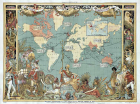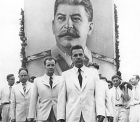World
The modern world cannot be studied without examining the course, impact and legacy of two world wars, the resources in this section set out to look at both the First and Second World Wars in their global context. The section also includes the Cold War and its impact in Latin America, South-East Asia and parts of Africa. This period also sees the rise and fall of European imperialism and the changing nature of global politics and economics as technology brings different stories from so many parts of the world directly to us. Read more
Sort by:
Date (Newest first) | Title A-Z
Show:
All |
Articles |
Podcasts |
Multipage Articles
-

What Have Historians Been Arguing About... the impact of the British Empire on Britain?
ArticleClick to view -

Women’s friendship in late eighteenth-century America and its relevance to lockdown
ArticleClick to view -

‘Power to the people’? Disputed presidential elections in US history
ArticleClick to view -

Glowing in the Dark
ArticleClick to view -

Volunteers to a man: an industrial workplace goes to war
ArticleClick to view -

History Abridged: The Berlin Conference 1884–1885
ArticleClick to view -

Film: China's Good War
ArticleClick to view -

History Abridged: POTUS - President of the United States
ArticleClick to view -

Kennedy and the Bay of Pigs
ArticleClick to view -

A (non-Western) history of versatility
ArticleClick to view -

On Black Lives Matter
ArticleClick to view -

Exploring Twentieth-Century History
ArticleClick to view -

What difference has the opening (and closing) of archives after 1991 made to the historiography of the Cold War?
ArticleClick to view -

How is the source base of the twentieth century different from that of earlier periods?
ArticleClick to view -

Real Lives: Tahereh (Tāhirih)
ArticleClick to view -

What is interesting about the Cold War?
ArticleClick to view -

Real Lives: Maria Rye’s emigration home for destitute little girls
ArticleClick to view -

The great British postwar exodus
ArticleClick to view -

Immigration and the making of British food
ArticleClick to view -

What is interesting about the interwar period?
ArticleClick to view

